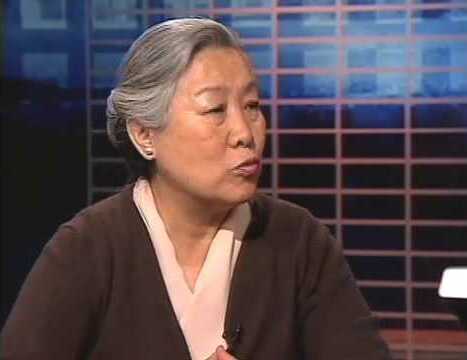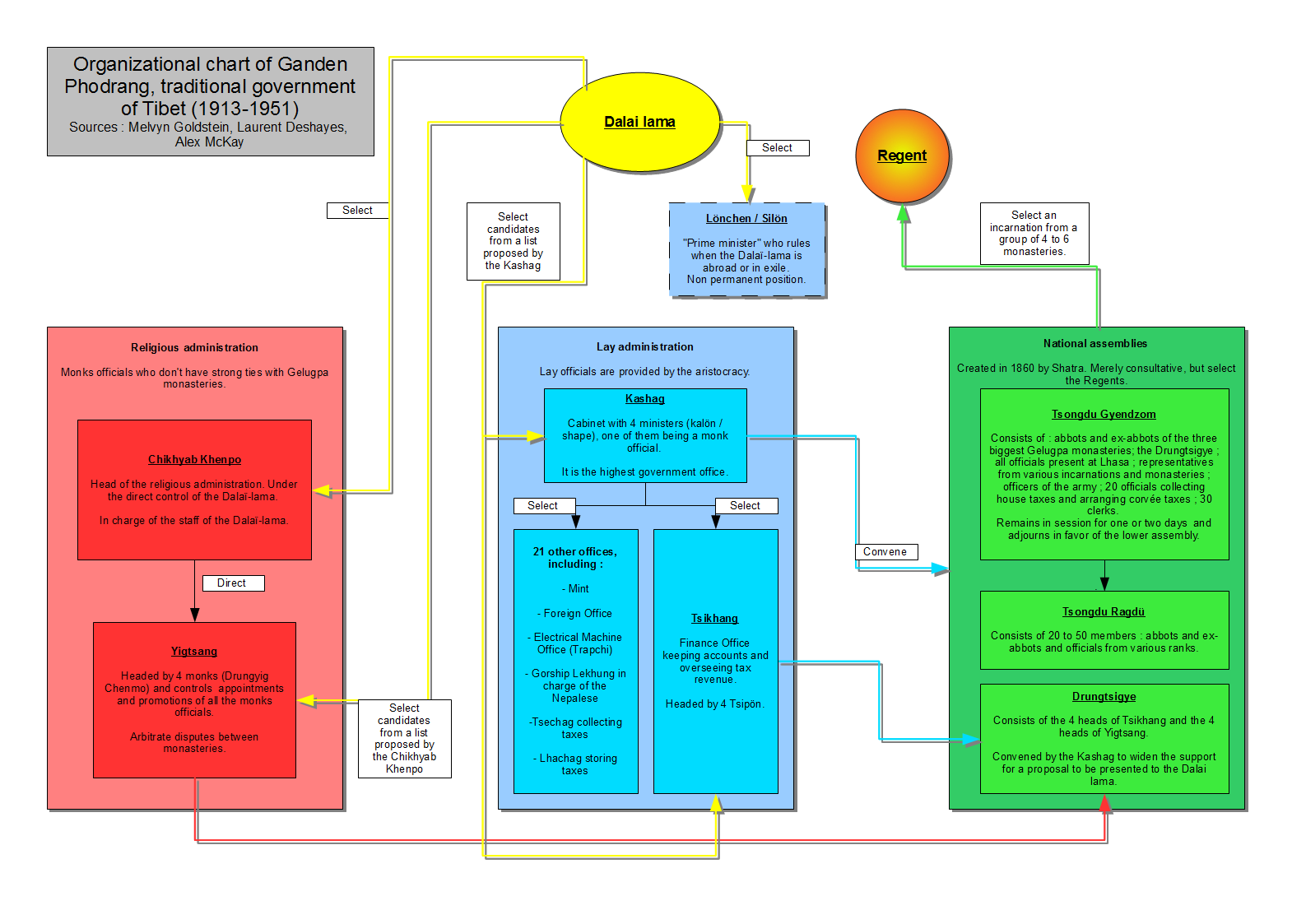|
Jetsun Pema (born 1940)
Jetsun Pema ( Tibetan: རྗེ་བཙུན་པདྨ་; Wylie: rje btsun padma; , born 7 July 1940) is the sister of the 14th Dalai Lama. For 42 years she was the President of the Tibetan Children's Villages (TCV) school system for Tibetan refugee students. Early life Jetsun Pema was born in Lhasa, on 7 July 1940. She went to India in 1950 and studied first at St. Joseph's Convent in Kalimpong and later at Loreto Convent in Darjeeling from where she completed her Senior Cambridge in 1960. In 1961, she went to Switzerland and then to England to do further studies. She returned to India in April 1964. Career At the behest of her elder brother, the 14th Dalai Lama The 14th Dalai Lama (born 6 July 1935; full spiritual name: Jetsun Jamphel Ngawang Lobsang Yeshe Tenzin Gyatso, shortened as Tenzin Gyatso; ) is the incumbent Dalai Lama, the highest spiritual leader and head of Tibetan Buddhism. He served a ..., she became the President of the Tibetan Children's Villa ... [...More Info...] [...Related Items...] OR: [Wikipedia] [Google] [Baidu] |
Jetsun Pema
Jetsun Pema (; Wylie: rje btsun padma, born on 4 June 1990) is the Queen of Bhutan as the wife of King Jigme Khesar Namgyel Wangchuck. She is currently the youngest queen consort in the world. She and the King have three children: Jigme Namgyel, the heir apparent to the Bhutanese throne, Jigme Ugyen, and Sonam Yangden. Early life and education Jetsun Pema was born at Jigme Dorji Wangchuck National Referral Hospital in Thimphu on 4 June 1990. Her father, Dhondup Gyaltshen, is the grandson of two ''Trashigang Dzongpons'', Thinley Topgay and Ugyen Tshering (governors of Trashigang) who were originally from Kurtoe Bhutan. Her mother, ''Aum'' Sonam Choki, comes from the family of Bumthang Pangtey, one of Bhutan's oldest noble families. Sonam Choki's father was a half-brother of two queens consort of Bhutan, Phuntsho Choden (great-grandmother of the present king) and her sister Pema Dechen. Her ancestor is also the 48th Druk Desi and 10th Penlop of Trongsa Jigme Namgyal ... [...More Info...] [...Related Items...] OR: [Wikipedia] [Google] [Baidu] |
Kalön
The Kashag (; ) was the governing council of Tibet during the rule of the Qing dynasty and post-Qing period until the 1950s. It was created in 1721, and set by Qianlong Emperor in 1751 for the Ganden Phodrang in the 13-Article Ordinance for the More Effective Governing of Tibet. In that year the Tibetan government was reorganized after the riots in Lhasa of the previous year. The civil administration was represented by the Council (Kashag) after the post of Desi (or Regent; ''see: dual system of government'') was abolished by the Qing imperial court. The Qing imperial court wanted the 7th Dalai Lama to hold both religious and administrative rule, while strengthening the position of the High Commissioners.Seventh Dalai Lama Kelsang Gyatso ''The Dalai Lamas of Tibet'', p. 101. Thubten Samphel and ... [...More Info...] [...Related Items...] OR: [Wikipedia] [Google] [Baidu] |
Mothers Of Earth
A mother is the female parent of a child. A woman may be considered a mother by virtue of having given childbirth, birth, by raising a child who may or may not be her biological offspring, or by supplying her ovum for fertilisation in the case of gestational surrogacy. A biological mother is the female genetic contributor to the creation of the infant, through sexual intercourse or egg donation. A biological mother may have legal obligations to a child not raised by her, such as an obligation of monetary support. An adoptive mother is a female who has become the child's parent through the legal process of adoption. A putative mother is a female whose biological relationship to a child is alleged but has not been established. A stepmother is a non-biological female parent married to a child's preexisting parent, and may form a family unit but generally does not have the legal rights and responsibilities of a parent in relation to the child. A father is the male counterpart of a ... [...More Info...] [...Related Items...] OR: [Wikipedia] [Google] [Baidu] |
Bharat Jyoti Award
Bharat, or Bharath, may refer to: * Bharat (term), the name for India in various Indian languages ** India, a country ** Bharata Khanda, the Sanskrit name for the Indian subcontinent ** Bharatavarsha, another Sanskrit name for the Indian subcontinent * Bharat (given name), a contemporary given name (including a list of people with the name) ** Bharath (actor) (born 1983), Indian actor in Tamil cinema * ''Bharat'' (film), a 2019 Indian Hindi-language drama by Ali Abbas Zafar * Bharat Biotech, an Indian biotechnology company * Bharat Electronics, an Indian aerospace and defence company * Bharat FC, a former Indian professional football team * Bharat Petroleum, an Indian oil and gas company * Bharat stage emission standards, a set of Indian emissions standards * Barat, Bannu, also Bharat, a village in Khyber Pakhtunkhwa, Pakistan * Bharath University, in Chennai, India * Bharatpol, Indian crime monitoring portal under the Central Bureau of Investigation * Pakpak Bharat, a regency in ... [...More Info...] [...Related Items...] OR: [Wikipedia] [Google] [Baidu] |
Human Rights Hero Award
Humans (''Homo sapiens'') or modern humans are the most common and widespread species of primate, and the last surviving species of the genus ''Homo''. They are great apes characterized by their hairlessness, bipedalism, and high intelligence. Humans have large brains, enabling more advanced cognitive skills that facilitate successful adaptation to varied environments, development of sophisticated tools, and formation of complex social structures and civilizations. Humans are highly social, with individual humans tending to belong to a multi-layered network of distinct social groups — from families and peer groups to corporations and political states. As such, social interactions between humans have established a wide variety of values, social norms, languages, and traditions (collectively termed institutions), each of which bolsters human society. Humans are also highly curious: the desire to understand and influence phenomena has motivated humanity's development of sc ... [...More Info...] [...Related Items...] OR: [Wikipedia] [Google] [Baidu] |
University Of San Francisco
The University of San Francisco (USF) is a Private university, private Society of Jesus, Jesuit university in San Francisco, California, United States. Founded in 1855, it has nearly 9,000 students pursuing undergraduate and graduate degrees in 59 major programs. In addition to its main campus in the Golden Gate area, it has satellite campuses in downtown San Francisco, Orange County, California, Orange County, Sacramento, California, Sacramento, San Jose, California, San Jose, and Santa Rosa, California, Santa Rosa. History Founded by the Jesuits in 1855 as St. Ignatius Academy, USF started as a one-room schoolhouse along Market Street (San Francisco), Market Street in what later became downtown San Francisco. Father Anthony Maraschi was the college's founder and first president, a professor, the college's treasurer, and the first pastor of St. Ignatius Church. Under Maraschi, St. Ignatius Academy received its charter to issue college degrees on April 30, 1859, from the Stat ... [...More Info...] [...Related Items...] OR: [Wikipedia] [Google] [Baidu] |
Light Of Education
Light, visible light, or visible radiation is electromagnetic radiation that can be perceived by the human eye. Visible light spans the visible spectrum and is usually defined as having wavelengths in the range of 400–700 nanometres (nm), corresponding to frequencies of 750–420 terahertz. The visible band sits adjacent to the infrared (with longer wavelengths and lower frequencies) and the ultraviolet (with shorter wavelengths and higher frequencies), called collectively ''optical radiation''. In physics, the term "light" may refer more broadly to electromagnetic radiation of any wavelength, whether visible or not. In this sense, gamma rays, X-rays, microwaves and radio waves are also light. The primary properties of light are intensity, propagation direction, frequency or wavelength spectrum, and polarization. Its speed in vacuum, , is one of the fundamental constants of nature. All electromagnetic radiation exhibits some properties of both particles and waves. Sing ... [...More Info...] [...Related Items...] OR: [Wikipedia] [Google] [Baidu] |




